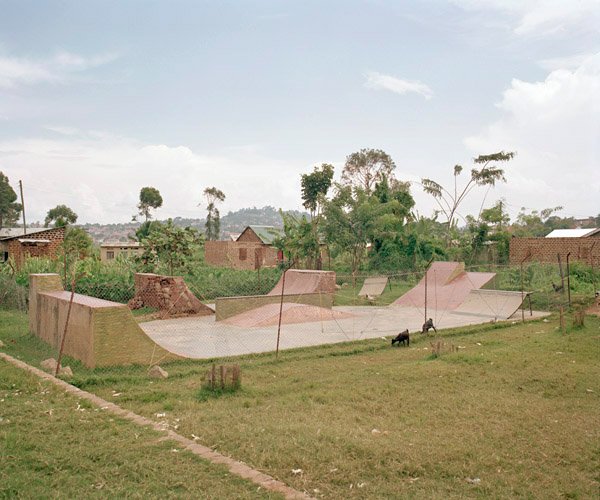|
|
The First Skate Park In Africa, By Yann Gross
|
Skateboarding was popularized by the 1986 skateboarding cult classic Thrashin', also known as Skate Gang directed by David Winters. It has appearances from many famous skaters such as Tony Alva, Tony Hawk, Christian Hosoi and Steve Caballero. The film starred Josh Brolin, who would go on to win acting awards for his roles in the films W., No Country for Old Men, Milk and Wall Street: Money Never Sleeps. Thrashin' also had a direct impact on Lords Of Dogtown as Catherine Hardwicke, who directed Lords Of Dogtown was hired by Winters to work on Thrashin' as a production designer where she met, worked with and befriended many famous skaters including the real Tony Alva, Tony Hawk, Christian Hosoi and Steve Caballero.
Skateboarding was, at first, tied to the culture of surfing. As skateboarding spread across the United States to places unfamiliar with surfing or surfing culture, it developed an image of its own. For example, the classic film short Video Days (1991) portrayed skateboarders as reckless rebels.
The image of the skateboarder as a rebellious, non-conforming youth has faded in recent years. Certain cities still oppose the building of skateparks in their neighborhoods, for fear of increased crime and drugs in the area. The rift between the old image of skateboarding and a newer one is quite visible: magazines such as Thrasher portray skateboarding as dirty, rebellious, and still firmly tied to punk, while other publications, Transworld Skateboarding as an example, paint a more diverse and controlled picture of skateboarding. Furthermore, as more professional skaters use hip hop, reggae, or hard rock music accompaniment in their videos, many urban youths, hip-hop fans, reggae fans, and hard rock fans are also drawn to skateboarding, further diluting the sport's punk image.
Films such as the 1986 Thrashin', Grind and Lords Of Dogtown, have helped improve the reputation of skateboarding youth, depicting individuals of this subculture as having a positive outlook on life, prone to poking harmless fun at each other, and engaging in healthy sportsman's competition. According to the film, lack of respect, egotism and hostility towards fellow skateboarders is generally frowned upon, albeit each of the characters (and as such, proxies of the "stereotypical" skateboarder) have a firm disrespect for authority and for rules in general. Group spirit is supposed to heavily influence the members of this community. In presentations of this sort, showcasing of criminal tendencies is absent, and no attempt is made to tie extreme sports to any kind of illegal activity.
|
|









